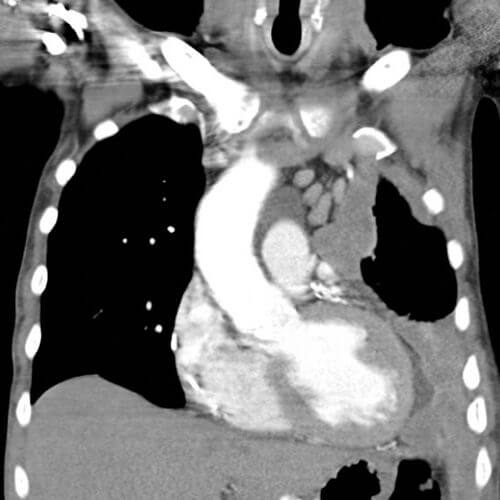New hope for mesothelioma patients around the world: researchers at the Technion and the USA have succeeded in halting the development of mesothelioma cancer by inhibiting the enzyme farnase in model animals. This enzyme breaks down the heparan sulfate - an important sugar component in the extracellular medium - and allows the cancer cells to attract blood vessels to them and send metastases

New hope for mesothelioma patients around the world: researchers at the Technion and the USA have succeeded in halting the development of mesothelioma cancer by inhibiting the enzyme farnase in model animals. This enzyme breaks down the heparan sulfate - an important sugar component in the extracellular medium - and allows the cancer cells to attract blood vessels to them and send metastases.
Mesothelioma is a cancer that affects the mesothelium - a thin membrane that protects internal organs in the chest and abdomen area. In most cases the disease is caused by exposure to asbestos. This rare disease is resistant to most anti-cancer drugs and currently has no effective treatment. Hence the importance of the joint research thatRecently published In the prestigious JNCI (Journal of the National Cancer Institute).
The research was conducted under the direction of Prof. Israel Valdavsky from the Technion and his colleague Prof. Harvey Fass from New York University (NYU). The research at the Technion was led by Dr. Uri Barash, Dr. Moshe Lapidot and Dr. Neta Ilan from the Rapaport Faculty of Medicine. Using mesothelioma samples collected by Prof. Fass over the years, the researchers confirmed the findings of Prof. Wlodavsky regarding the role of heparinase in the development of mesothelioma cancer.
The collaborative research group discovered that mesothelioma cancer cells use the enzyme farnase to break through tissue barriers surrounding the developing tumor and pull blood vessels that feed it. Furthermore, the breakdown of the extracellular medium causes the release of growth-promoting proteins and thus accelerates the development of the cancerous tumor. The heparinase, secreted by the cancer cells and the cells of the tumor microenvironment, initiates a vicious circle in which the inflammation and the tumor reinforce each other.
The joint group (Technion-NYU Langone) was able to break this vicious circle using paranase inhibitors. The study showed, first, that the farnase does accelerate the development of the disease in mesothelioma patients; As the level of heparinase in the patient's tissues increases, life expectancy decreases. Second, in experiments with human cancer cells in mice it was found that silencing the expression of the heparnase gene inhibits tumor development. The paranase inhibitors (the compounds PG545 and Defibrotide) significantly inhibited the development of the tumor and greatly prolonged the survival of the treated mice. The use of paranase inhibitors yielded a greater benefit than the chemotherapy drug cisplatin, which is currently used to treat the disease. The research findings give new hope to mesothelioma patients around the world, and the researchers are now promoting clinical trials that will test the therapeutic potential of paranase inhibitors in this deadly disease.
The study was conducted as part of the Laura and Isaac Perlmutter Cancer Research Program. Prof. Volodevsky is a faculty member at the Rappaport Faculty of Medicine and a member of the Integrated Center for Cancer Research at the Technion (TICC), and he is the world's leading expert in farnase research and is the one who discovered the importance of this enzyme as a target for drug therapy.
Prof. Fass is the head of the Department of Thoracic Surgery at NYU Langone Medical Center and a member of the Perlmutter Cancer Center. Prof. Fass has been collecting tissue samples from his patients since he was head of the breast oncology unit at the National Cancer Institute (NCI). Today, this database contains frozen samples from hundreds of mesothelioma patients, which were used to discover the role of heparinase in mesothelioma.
More on the subject on the science website

4 תגובות
Although the articles are old, there may be something to it.
I've been suffering from myztlitma since January 18, after bath surgery, a round of treatments of Keytruda, Chemo, Yerboi, Levetniv, when the last phetsit in August shows a benefit,
52 years old from the north, is she suitable for research, I will be happy 0526190039
This week we were informed that my father has mesothelioma, he is 70 years old and it was explained to us that surgery is not on the agenda and the only treatment he will receive is chemotherapy.
Is it suitable for research?
My husband Eitan has mesothelioma. Diagnosis a few months ago. Is it suitable for you for a clinical trial? We have nothing to lose. Thank you. Dalia Oren
I read the article very carefully as a peritoneal mesothelioma patient. In June 2008, I underwent a complex operation to remove mesothelioma and also hot chemotherapy at the end of the operation. I underwent one course of chemotherapy in August 2008 systemic with cisplatin and alimta. About a week after the treatment, signs of the Jillian-Barra neurological syndrome appeared. The chemotherapy was of course stopped and I was treated with Gillian-Barra for a year. Treatment against mesothelioma consisted only of follow-up with CT PET and until December 2015 no symptoms of mesothelioma appeared. In January 2016 I was operated on again with intra-abdominal chemotherapy. I did not do systemic treatment because there is a risk of a reappearance of Jillian-Bara. Today there is a disease in the stomach, widespread, but I am asymptomatic and feel well. A year ago I did a genetic test at the Fundation Medicin company and no mutated genes were found, neither in the tissues removed during surgery nor in the blood test. The discovery of the farnase enzyme as responsible for the mesothelioma disease and the good results obtained for suppressing the enzyme, seems revolutionary to me. Is a case like mine suitable for a clinical trial?